
Paolo Rossi was an Italian professional footballer who played as a forward. He led Italy to the 1982 FIFA World Cup title, scoring six goals to win the Golden Boot as top goalscorer, and the Golden Ball for the player of the tournament. Rossi is one of only three players, and the only European, to have won all three awards at a World Cup, along with Garrincha in 1962 and Mario Kempes in 1978. Rossi was also awarded the 1982 Ballon d'Or as the European Footballer of the Year for his performances. Along with Roberto Baggio and Christian Vieri, he is Italy's top scorer in World Cup history, with nine goals overall.

Gianluigi "Gigi" Buffon is an Italian former professional footballer who played as a goalkeeper. Widely regarded as one of the greatest goalkeepers of all time, and by some the greatest ever, he is one of the few recorded players to have made over 1,100 professional career appearances and holds the record for the most appearances in Serie A.
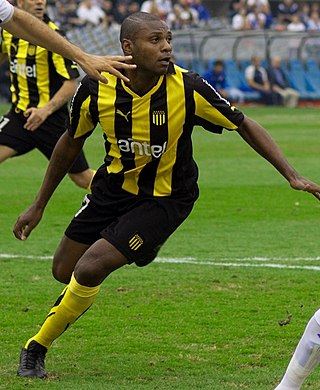
Marcelo Danubio Zalayeta is a Uruguayan former footballer who played as a striker.

Mauro Germán Camoranesi Serra is an Argentinian-Italian football manager and former player who played as a right midfielder or right winger. He is the head coach of Cypriot First Division club Anorthosis Famagusta.

Andrea Pirlo is an Italian football manager and former professional player. Considered one of the greatest midfielders of all time, Pirlo was known for his vision, technique, creativity, passing, and free kick ability.
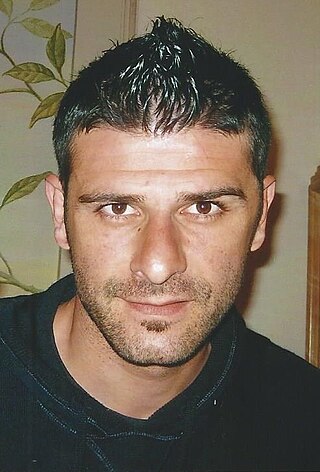
Vincenzo Iaquinta is an Italian former professional footballer who played as a striker.
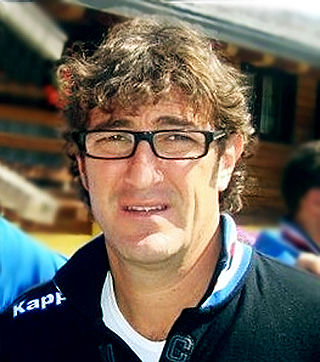
Ciro Ferrara is an Italian former footballer and manager. Ferrara spent his playing career as a defender, initially at Napoli and later on at Juventus, winning seven total Serie A titles as well as other domestic and international trophies.
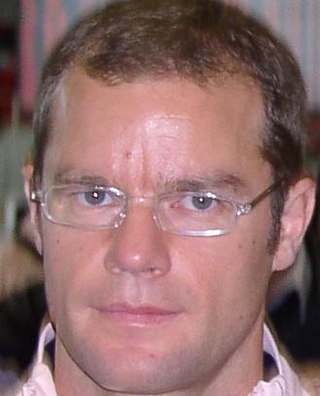
Gianluca Pessotto is an Italian former professional footballer who played as a defender or midfielder. A former Italy international, he spent the majority of his club career with Juventus, where he won several domestic and international trophies, and is now head of its youth system. He represented his country at the 1998 FIFA World Cup, and at UEFA Euro 2000, reaching the final of the latter tournament.
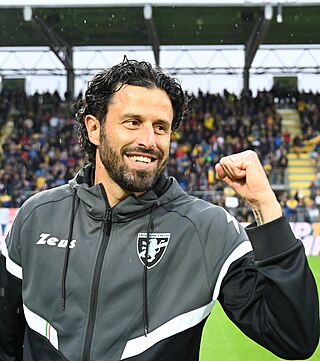
Fabio Grosso is an Italian professional football manager and former player. He is currently the head coach of Serie B club Sassuolo.
Mark Iuliano is an Italian football manager and a former professional footballer who played as a defender. Following his retirement he worked as a coach.

Giorgio Chiellini is an Italian former professional footballer who played as a centre-back or left-back. Considered one of the best defenders of all time, Chiellini was known for his strength, aggressiveness and man-marking, as well as his ability to play in either a three or four-man defense.

Héctor Fabián Carini Hernández is a Uruguayan former professional footballer who played as a goalkeeper.

Daniel Fonseca Garis is a Uruguayan former footballer and a current football agent. A former forward, throughout his playing career, he played for Uruguayan side Nacional, as well as Italian clubs Cagliari, Napoli, Roma, Juventus, and Como, and Argentine side River Plate, winning titles with both Nacional and Juventus. At international level, he represented Uruguay on 30 occasions between 1990 and 1997, scoring 11 goals, and also took part at the 1990 FIFA World Cup and the 1995 Copa América, winning the latter tournament.

Claudio Marchisio is an Italian former professional footballer who played as a midfielder.

Walter Alejandro Gargano Guevara is a Uruguayan former footballer who played as a defensive midfielder.

José Martín Cáceres Silva is a Uruguayan professional footballer who plays for Major League Soccer club LA Galaxy. Mainly a centre-back, he can also play on either flank, mostly as a right-back.

Alessandro Del Piero is an Italian former professional footballer who mainly played as a second striker, although he was capable of playing in several offensive positions. Since 2015, he has worked as a pundit for Sky Sport Italia. A technically gifted and creative supporting forward who was also a free-kick specialist, Del Piero won the Serie A Italian Footballer of the Year award in 1998 and 2008 and received multiple nominations for the Ballon d'Or and FIFA World Player of the Year.

Mattia De Sciglio is an Italian professional footballer who plays as a right-back for Serie A club Empoli, on loan from Juventus, and the Italy national team.

Paulo Exequiel Dybala is an Argentine professional footballer who plays as an attacking midfielder or winger for Serie A club Roma and the Argentina national team. Nicknamed "La Joya", he is known for his dribbling and goalscoring.

Matías Soulé Malvano is an Argentine professional footballer who plays as an attacking midfielder, right winger or forward for Serie A club Roma.



















